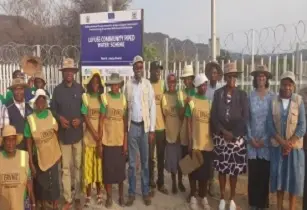The Government of Zimbabwe, the Food and Agriculture Organisation of the United Nations (FAO) and UNICEF are implementing an integrated resilience building European Union funded project entitled: ‘Enhanced Resilience for Vulnerable Households in Zimbabwe,’ (ERVHIZ) which was initiated in 2020
The project which is implemented in six districts of the Matabeleland South province, focuses on agriculture, nutrition and WASH interventions coupled with early warning anticipatory actions to protect lives and productive assets against the impact of economic and climate hazards.
A high-level field mission took to the field to take stock of the results of the unique agriculture-nutrition integration with WASH interventions. Towards the end of the mission, Deputy Minister of Lands, Agriculture, Fisheries, Water and Rural Development (MLAFWRD), Davis Marapira remarked, The Government of Zimbabwe is very impressed by the progress made in this project as evidenced by what we have seen on the ground. We can see that there is a lot of infrastructure development and capacity building of communities which will ensure resilience and sustainability beyond the project life cycle.”
The field mission demonstrated the integration approach as evidenced by the visits to Farmer Field Schools, a flagship FAO approach to transformative agrifood systems; field visits to solar-powered piped water schemes, nutrition gardens, nutrition care groups, youth entrepreneurship groups as well as school health clubs.
The UNICEF Country Representative, Tajudeen Oyewale commented the importance of integration among development partners in particular the UN to UN coordination aligned to the cooperation framework and the Government’s National Development Strategy 1.
Results on the ground clearly show that the ERVHIZ is well poised to transform the livelihoods of vulnerable households in the face of economic and climate induced shocks and stresses in Zimbabwe. The tour concluded with the government calling on for replication and expansion of the ERVHIZ model to other provinces and districts in Zimbabwe.





